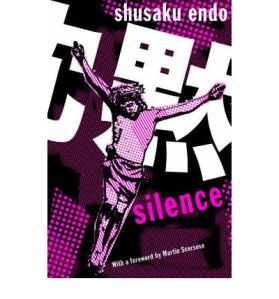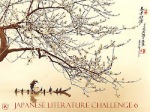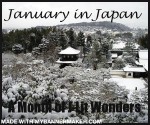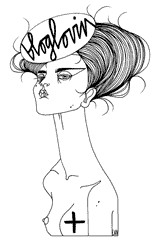Silence by Shusaku Endo
23 January, 2013
Lord, why are you silent?
Why are you always silent…..?
Shusaku Endo’s Silence is probably his most famous novel. Like The Samurai and The Volcano, it is a study of Christianity in early modern Japan and the terrible path it carved through the lives of its believers and those who tried to stamp it out.
It is almost 60 years after Francis Xavier’s successful mission to Southern Japan. But the Tokugawa Shogunate, fearing the growing popularity of Christianity amongst the country’s poor and the possible fomentation of anti-government sentiment, has closed Japan’s doors against outsiders, leading the country into self-imposed isolation and declaring a ban on Christianity. It is in this harsh period of forced apostasy and danger that the Jesuit priest Sebastian Rodrigues and his companions set out from Portugal to discover the fate of their teacher, Christovão Ferreira, who has disappeared in Japan after rumours of his apostasy sent shock waves across the Christian world. Via Macao, they board a ship to a village near Nagasaki and there, their ideas and views on their vocation and the land they had dreamt of comes under increasing attack as they realise that the path they have chosen is harsher than anything they ever expected.
My reading of Silence as a non-Christian will probably differ from those who do believe, and yet, I feel that Endo successfully manages to get to the root of what he is trying to portray and shows the reader the real, honest and true anguish of someone who is trying to understand what it means to have faith and to live their life in a true and meaningful way.
I don’t think I have ever come across another novelist who has managed to do this in such a searing portrayal of a man struggling against fear and doubt and still trying to do justice to his vocation. Rodrigues is constantly treading water, at the edge of desperation, as he sees his flock captured, forced to step on fumie and apostatise, tortured and killed. He is perpetually caught between wanting to end the suffering of the Japanese Christians and staying true to his vocation, that he must continue his mission to spread and uphold his faith in Japan. It is a struggle from the beginning as most Christian converts are from the lower orders of the social hierarchy; many are peasants who are struggling with poverty and whose lives are hellish.
for a long, long time these farmers have worked like horses and cattle; and like horses and cattle they have died. The reason our religion has penetrated this territory like water flowing into dry earth is that it has given to this group of people a human warmth they never previously knew. For the first time they have met men who treated them like human beings.
You are there with Rodrigues as he jumps from one painful situation to the next, always shadowed by his Judas, the wretched, weak apostate Kichijiro, until he is finally captured himself. And there he comes face to face with the man he has come to Japan to find, his teacher Ferreira. And this is where his real struggle begins.
SPOILER ALERT (click and highlight to see text)
I was expecting Rodrigues to die at the end of the novel. But what Endo has done is something I hadn’t expected. Something much worse. And also something which really drives home and makes you think about what it must mean to have true faith. Does the fact that you have stepped on a fumie mean that you are an unbeliever? Can you really choose between stopping someone’s torture and keeping your own hands clean? And most importantly, Rodrigues finally believes that God had spoken to him and shown him the way, that by apostatising, he has become a true Christian and is saving his brethren from death. I may have gotten this all wrong but I found the ending to be truly painful but the fact that Rodrigues did not take his own life must mean that although he has no choice but to comply with his captors, he has found some kind of peace within himself and found meaning in his Christianity. But I’m not really sure.
END OF SPOILER
Endo’s portrayal of Rodrigues is that of a real blood, sweat and tears man. A man who is struggling with what he believes and what he thinks is the right thing to do. It’s a vital, anguished portrayal but one which really touched me. There are hardly any clean, beautiful characters in this novel. It’s raw and gritty and wretched. And yet it stays with you. The Samurai showed how Christianity lifted some of the burden from the lives of the poor peasants in feudal Japan but Silence shows how much the Japanese and their Portuguese priests had to give up in order to protect their faith.
There is a word in Japanese, shugyo (修行), which loosely translates as an apprenticeship or training with roots in Buddhism. It’s often used to denote a period of training that one must undergo in order to become stronger, to achieve success or some sort of enlightenment. Rodrigues’ ordeal is akin to this. He doesn’t shy away from it, knowing that he must get through it in order for there to be some meaning in his life, for there to be a link with his faith.
I finished reading Silence almost two weeks ago but Rodrigues’ struggle still lingers in my mind as I try to understand whether he managed to come to terms with his choices. I am in awe of what Endo has accomplished here (together with William Johnston’s superb translation) and will definitely be seeking more of his novels to read as I hope some of you will too.
Do check out Bellezza and Tony‘s posts and Tanabata‘s discussion of Silence and Teresa has posted on a new translation of Kiku’s Prayer.
*Do also check out Teresa’s post on re-reading Silence.
I read this as part of Bellezza‘s Japanese Literature Challenge 6, Tony‘s January in Japan and Ana and Iris‘ Long Awaited Reads Month.
The Volcano by Shusaku Endo
12 November, 2010
What a mount of heartache it is. A volcano resembles human life. in youth it gives reign to the passions, and burns with fire. it spurts out lava. but when it grows old, it assumes the burden of past evil deeds, and it turns as quiet as a grave.
So intones Professor Koriyama to Jinpei Suda, Section Chief of the the Weather Bureau, in Shusaku Endo’s novella, The Volcano. Like The Samurai, The Volcano is a meditation on man’s humanity, faith and the ties that bind him to others.
It’s Jinpei Suda’s retirement day from his job at the Weather Bureau. As he is forced to confront that the most important part of his life is over, he is also trying to realise his dream of publishing his research on Mount Akadaké, the volcano which has been at the centre of his working life and the city of Shirahama in which he lives. Known by his colleagues as the Demon of Akadaké because of his love of climbing the dormant volcano, Suda is reluctant to give up his ties with the volcano. In order to finance his publication, he finds himself providing professional assurance to City Councilman Aiba, a business man intent on building a hotel on Mount Akadaké to generate tourism and profit. As it tallies with his belief that Mount Akadaké is no longer active, this seems a perfect deal for Suda. However, at a meeting with the businessman, Suda suddenly has a stroke and is hospitalised. As his physical health crumbles, he slowly sees the cracks in his family life, his career and finally the realisation that his many years of volcanic research may not be entirely correct.
Running parallel to Suda’s story is that of Father Sato who runs the Catholic church in Shirahama and his errant predecessor, Durand, who was excommuniated 8 years earlier for being involved in a scandal. Father Sato is busy with his pastoral care and his pet project in building a retreat on Mount Akadaké. Durand, whose health is broken, is living pitifully at the hospital in the room next to Suda. Out of duty, Father Sato visits him two or three times a year, always leaving behind some money or food, but his distaste is obvious and Durand is no fool. As tremors are felt from Mount Akadaké, Durand feels that what has been brewing in the Church’s quest to evangelise a nation that thinks completely differently from Europeans with regard to the notion of sin will erupt just as sin cannot be erased from humanity.
Here, Endo is masterful in showing the disintegration of belief and the petty pride and fight for control that plague the Church in Japan. I don’t think it denigrates the Church in any way (as Endo himself was a practicing Catholic) but it shows the Church and its priests in a more human way. Belief comes with doubt and Endo deals with and questions it in a deep and probing manner. Endo also questions the notion of sin and how it is perceived by the Japanese whose idea of it differs greatly from Europeans. But it is not just the Christians who face difficulty when it comes to assessing their lives. What permeates Endo’s novel is the notion that human life is never what it seems and that what we perceive is our due may not be what we get.
As you can probably tell, I loved The Volcano. The translation by R.A. Schuchert was smooth, although there were some words that seemed old-fashioned and could have just been left in Japanese, but these are minor quibbles in what was a wonderful translation. There is a depth to Endo’s writing which didn’t come across as too serious or boring and I will definitely be reading more of his novels. Endo is fast becoming one of my favourite Japanese authors.
I read this for Dolce Bellezza‘s Japanese Literary Challenge 4.
The Samurai by Shusaku Endo
1 July, 2010
Silence by Shusaku Endo seems to be a favourite amongst bloggers this year and I was thinking of reading it believing I had a copy on my TBR pile, but instead I found myself with a copy of Scandal. Well, they both begin with an S… I was then browsing in my local library and found The Samurai and snapped it up (naturally). I have to confess this is my first novel by Endo who has been on my radar for a while (I actually have another novel by him, The Volcano which I’m hoping to read later) and felt a tad intimidated as he’s one of Japan’s foremost writers plus a favourite of my favourite David Mitchell (I will stop going on about him one day, really!)
So I was expecting Endo’s novel to be good, but I didn’t expect it to be so beautifully introspective. There’s been a lot of discussion on blogs about translations and the importance of translators and I feel that with Van C. Gessel who translated The Samurai, Endo struck lucky because it was smooth, well paced and captured the spirit of the novel.
Endo is famous for being a Catholic writer in Japan, and his work addresses the issues that Catholics faced in Japan throughout their turbulent history. On top of this add the complex nature of Japan’s isolationist policy in the 17th century, their attitude towards foreigners and the religious, political, military and economic ambitions of the great European naval empires and you get a very intricate and multi-faceted story to tell.
In The Samurai, Endo focusses on Hasekura, a low-ranking samurai, and his trip to Nueva España (Mexico), Spain and Italy in the company of Father Velasco, an ambitious Franscican Padre. Japan has finally been unified under Tokugawa Ieyasu who has expelled the Christian missionaries from Edo (Tokyo) resulting in a mass migration south of Europeans and converted Japanese Catholics to more accomodating pastures. Some of the powerful clans outside Edo are interested in the European trade concessions and are eager to forge alliances with the Europeans. Hasekura and his companions are sent on a mission by their feudal lord to open negotiations with Nueva España. Father Velasco, their translator, is determined to become Bishop of Japan and convert them in the process. Endo spins a tale about the journey both physical and spiritual over the course of seven hard years and the fate of these men when they return to a Japan that has changed considerably in their absence.
What Endo has done with this novel is to show the internal struggles that people have with their faith: questioning, discovering and affirming. It’s not an easy journey and it’s not always beautiful. What struck me was that he really understood Christianity to be a religion for the poor and suffering, especially for those with no hope of escape from their indenture and grinding poverty, and you can understand why so many people converted to Christianity in the face of such deadly repercussions. Life wasn’t fair, especially for the poor and weak. And Endo does this beautifully in his portrayal of the samurai Hasekura and his loyal retainer Yuzo. I loved this book for its quiet beauty, especially Endo’s description of the harsh reality of rural life, whether you were a samurai or a commoner. This is not a quick read but I didn’t want to miss a single word. And what is amazing is that Endo based his tale on real historical figures.
I read this for Dolce Bellezza‘s Japanese Literary Challenge 4.
















